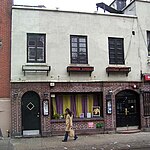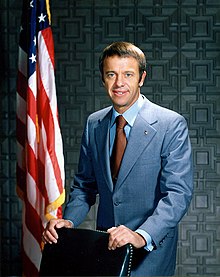Portal:1960s
The 1960s Portal
The 1960s became synonymous with the new, radical, and subversive events and trends of the period. In Africa the 1960s was a period of radical political change as 32 countries gained independence from their European colonial rulers. Some commentators have seen in this era a classical Jungian nightmare cycle, where a rigid culture, unable to contain the demands for greater individual freedom, broke free of the social constraints of the previous age through extreme deviation from the norm. Christopher Booker charts the rise, success, fall/nightmare and explosion in the London scene of the 1960s. However, this alone does not explain the mass nature of the phenomenon. Several nations such as the U.S., France, Germany and Britain turned to the left in the early and mid 1960s. In the United States, John F. Kennedy, a Keynesian and staunch anti-communist, pushed for social reforms. His assassination in 1963 was a stunning shock. Liberal reforms were finally passed under Lyndon B. Johnson including civil rights for African Americans and healthcare for the elderly and the poor. Despite his large-scale Great Society programs, Johnson was increasingly reviled by the New Left at home and abroad. The heavy-handed American role in the Vietnam War outraged student protestors across the globe, as they found peasant rebellion typified by Ho Chi Minh and Che Guevara more appealing. Italy formed its first left-of-center government in March 1962 with a coalition of Christian Democrats, Social Democrats, and moderate Republicans. Socialists joined the ruling block in December 1963. In Britain, the Labour Party gained power in 1964. In Brazil, João Goulart became president after Jânio Quadros resigned. This is a Featured article, which represents some of the best content on English Wikipedia..
Highway 61 Revisited is the sixth studio album by the American singer-songwriter Bob Dylan, released on August 30, 1965, by Columbia Records. Dylan continued the musical approach of his previous album Bringing It All Back Home (1965), using rock musicians as his backing band on every track of the album in a further departure from his primarily acoustic folk sound, except for the closing track, the 11-minute ballad "Desolation Row". Critics have focused on the innovative way Dylan combined driving, blues-based music with the subtlety of poetry to create songs that captured the political and cultural climate of contemporary America. Author Michael Gray argued that, in an important sense, the 1960s "started" with this album. Preceded by the hit single "Like a Rolling Stone", the album features songs that Dylan has continued to perform live over his long career, including "Ballad of a Thin Man" and the title track. He named the album after the major American highway which connected his birthplace of Duluth, Minnesota, to southern cities famed for their musical heritage, including St. Louis, Memphis, New Orleans, and the Delta blues area of Mississippi. (Full article...) This is a Good article, an article that meets a core set of high editorial standards.
On the evening of 8 December 1980, the English musician John Lennon, formerly of the Beatles, was shot and fatally wounded in the archway of the Dakota, his residence in New York City. The killer, Mark David Chapman, was an American Beatles fan who was envious and enraged by Lennon's lifestyle, alongside his 1966 comment that the Beatles were "more popular than Jesus". Chapman said he was inspired by the fictional character Holden Caulfield from J. D. Salinger's novel The Catcher in the Rye, a "phony-killer" who loathes hypocrisy. Chapman planned the killing over several months and waited for Lennon at the Dakota on the morning of 8 December. Early in the evening, Chapman met Lennon, who signed his copy of the album Double Fantasy and subsequently left for a recording session at the Record Plant. Later that night, Lennon and his wife, Yoko Ono, returned to the Dakota to say goodnight to their son before an impromptu date night. As Lennon and Ono approached the entrance of the building, Chapman fired five hollow-point bullets from a .38 special revolver, four of which hit Lennon in the back. Lennon was rushed to Roosevelt Hospital in a police car, where he was pronounced dead on arrival at 11:15 p.m. at age 40. Chapman remained at the scene reading The Catcher in the Rye until he was arrested by the police. It was later discovered that Chapman had considered targeting several other celebrities as well as Lennon, including David Bowie. (Full article...) Selected picture - Photo taken by a Lockheed U-2 spy plane of the San Cristobal MRBM launch site in Cuba, November 1962, after the Cuban Missile Crisis. Although this image was taken days after the crisis had ended (October 28), this image has become iconic of the crisis to the point where it is often cited incorrectly as having been taken during the crisis.
Did you know -
Related portalsThis is a Featured article, which represents some of the best content on English Wikipedia..
Alan Bartlett Shepard Jr. (November 18, 1923 – July 21, 1998) was an American astronaut. In 1961, he became the second person and the first American to travel into space and, in 1971, he became the fifth and oldest person to walk on the Moon, at age 47. A graduate of the United States Naval Academy at Annapolis, Shepard saw action with the surface navy during World War II. He became a naval aviator in 1947, and a test pilot in 1950. He was selected as one of the original NASA Mercury Seven astronauts in 1959, and in May 1961 he made the first crewed Project Mercury flight, Mercury-Redstone 3, in a spacecraft he named Freedom 7. His craft entered space, but was not capable of achieving orbit. He became the second person, and the first American, to travel into space. In the final stages of Project Mercury, Shepard was scheduled to pilot the Mercury-Atlas 10 (MA-10), which was planned as a three-day mission. He named Mercury Spacecraft 15B Freedom 7 II in honor of his first spacecraft, but the mission was canceled. (Full article...) This is a Good article, an article that meets a core set of high editorial standards.
Stanley Kubrick (/ˈkuːbrɪk/; July 26, 1928 – March 7, 1999) was an American film director, screenwriter, producer, and photographer. Widely considered one of the greatest filmmakers of all time, his films were nearly all adaptations of novels or short stories, spanning a number of genres and gaining recognition for their intense attention to detail, innovative cinematography, extensive set design, and dark humor. Born and raised in New York City, Kubrick was an average school student but displayed a keen interest in literature, photography, and film from a young age; he began to teach himself all aspects of film producing and directing after graduating from high school. After working as a photographer for Look magazine in the late 1940s and early 1950s, he began making low-budget short films and made his first major Hollywood film, The Killing, for United Artists in 1956. This was followed by two collaborations with Kirk Douglas: the anti-war film Paths of Glory (1957) and the historical epic film Spartacus (1960). (Full article...) Selected article -In November 1963, President Ngô Đình Diệm and the Personalist Labor Revolutionary Party of the Republic of Vietnam (South Vietnam) were deposed by a group of CIA-backed Army of the Republic of Vietnam officers who disagreed with Diệm's handling of the Buddhist crisis and the North Vietnamese and Viet Cong threat to South Vietnam. In South Vietnam, the coup was referred to as Cách mạng 1-11-63 ("1 November 1963 Revolution"). The Kennedy administration had been aware of the coup planning, but Cable 243 from the United States Department of State to U.S. Ambassador to South Vietnam Henry Cabot Lodge Jr. stated that it was U.S. policy not to try to stop it. Lucien Conein, the Central Intelligence Agency's liaison between the U.S. Embassy and the coup planners, told them that the U.S. would not intervene to stop it. Conein also provided funds to the coup leaders. (Full article...) More Did you know (auto generated)
TopicsCategoriesWikiProjects
Associated WikimediaThe following Wikimedia Foundation sister projects provide more on this subject:
Discover Wikipedia using portals |




























